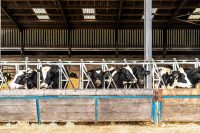A financially strategic plan for farming succession

17th March 2021
-
Catherine Vickery See profile
Succession planning and encouraging new entrants into a farming business can be a daunting prospect, but opening the discussion early can put your business on a far surer footing.
Taking control of succession planning enables you to better manage family relationships, reduce tax bills, and make positive changes for the future. So how do you go about starting such discussions?
To begin with, you need to have an open, frank conversation with everyone who has an interest in the business. Invite an independent third party to oversee it, and put the plan on paper. It’s important that future generations are involved, and that everyone is clear about their personal and business objectives.
When it comes to succession planning, families often fail to recognise the distinction between being equal and fair. Trying to split assets equally between siblings may not be fair – or the best option for the business – but there are ways to achieve a successful outcome for everyone. For example, if one child gets a house and an income stream, such as rental return, while another gets the farm, with a higher capital value but greater work commitment, this could be regarded as a fair outcome, and one which would enable the business to continue.
Tax planning is always a critical consideration when it comes to re-evaluating business strategy and inheritance – but it should not be the driving factor, so make sure the tax fits the objectives, not the other way around.
To make the business more efficient in the longer term, consider investing in new technology now. Capital allowances, which provide 100% up-front tax relief on qualifying expenditure up to £1,000,000, make such purchases extremely tax efficient in the short term, and the equipment could dramatically improve future sustainability. Companies can benefit from an uncapped super-deduction at 130% on plant and machinery expenditure from April 2021 to March 2023 meaning now could be a good time to make that investment.
Many farmers operate as sole traders or family partnerships, but changes over the years to the tax regime have made trading as a limited company extremely tax efficient in certain circumstances. It may be worth incorporating to take advantage of those lower tax rates. Corporation Tax rates are currently 19%, although due to increase to 25% from April 2023. That compares to individual tax rates of 40-45% for higher and additional taxpayers, so the savings can be significant, even with that increase in Corporation Tax rates.
Shareholders and directors pay Income Tax on any salary drawn from the company, but can also extract profits via pension contributions and dividends to minimise personal tax bills. Profits retained in the business are not subject to further tax, which makes a limited company particularly suitable for businesses looking to reinvest.
However, the Chancellor recently announced plans to target people who have incorporated to benefit from the lower rates, meaning shareholders could face increased Income Tax charges when extracting profits in future. Partnership profit shares are also likely to come under scrutiny.
Changing your business structure – even if it is just bringing in a new partner – can have a significant impact on Capital Gains Tax (CGT) and Inheritance Tax (IHT), as well as voiding existing Wills. There are a number of areas that need to be considered carefully, and you will want to retain these valuable tax reliefs to benefit succession planning at a later stage. So it’s important to take professional advice before changing a business structure.
Whatever changes you decide to make as a family business, it’s vital that agreements are drafted professionally, to clarify matters in the event of a dispute. It’s far easier to draft agreements with a level head than waiting until a dispute arises. The same applies to any changes in the family make-up: consider pre- or post-nuptial agreements to avoid the potential break-up of the farm in the unfortunate event of a divorce, and always redraft your will following a marriage, birth or divorce.
One common change in farming businesses that can have a significant impact on tax is diversification. Many farmers are considering this option to spread the income risk and provide for growing family interests. But it’s important to weigh up whether you have the required skillset and passion to run a new enterprise, and the impact it could have on both CGT and IHT reliefs.
When it comes to handing over the reins, the older generation may look to move out of the farmhouse to make sure it remains actively occupied for business purposes, and thereby qualifies for Agricultural Property Relief from Inheritance Tax (IHT). However, you should also consider whether it – or other properties – qualify for the new Residence Nil Rate Band (RNRB), which affords an extra £175,000 on top of an individual’s existing £325,000 nil-rate band for IHT purposes.
If your whole estate is worth more than £2 million the RNRB will be tapered down, and above £2.35 million it will not be available at all, so it could be worth using lifetime gifts to maximise the tax reliefs available.
It’s also important to consider provision for retirement, when you are ready to take a step back and let the younger generation get more involved. You will want to be financially independent of the farm to confidently let go of the reins, so look at what other income you have – or potentially could have.
From the age of 55 farmers can take a lump sum or regular payments from their pension. However, you might also consider using a Self-Invested Personal Pension (SIPP) to fund tax-free investment in the farm. You could, for example, use the SIPP to build a new barn or buy land, and then rent it back to the farm, thereby reducing its taxable profits. When you need to release your pension funds, you can either sell the asset, or pass the SIPP on to the younger generation – an extremely tax-efficient way of handing down assets. But it’s essential that you are proactive and fill out a nomination form, identifying who you want to inherit your pension.
If your business doesn’t have a successor, you might consider selling livestock or machinery and using a contractor, or finding an alternative use for your assets while stepping back from the day-to-day work. There is always a different way of doing things, it just requires a new perspective.
Joint ventures can also provide a suitable option, helping you to change direction while mentoring incoming new entrants. Simply renting land out has important IHT and CGT implications, so joint ventures can be really attractive. They are good for the industry in terms of bringing in new blood and marrying it with experience, and they can minimise the negative tax implications.
Every farming business will find a different way to manage succession planning to secure the future viability of the farm. Just by having the conversation, you and your family will feel more in control and more confident about the future. It’s an exciting time to move ahead.

